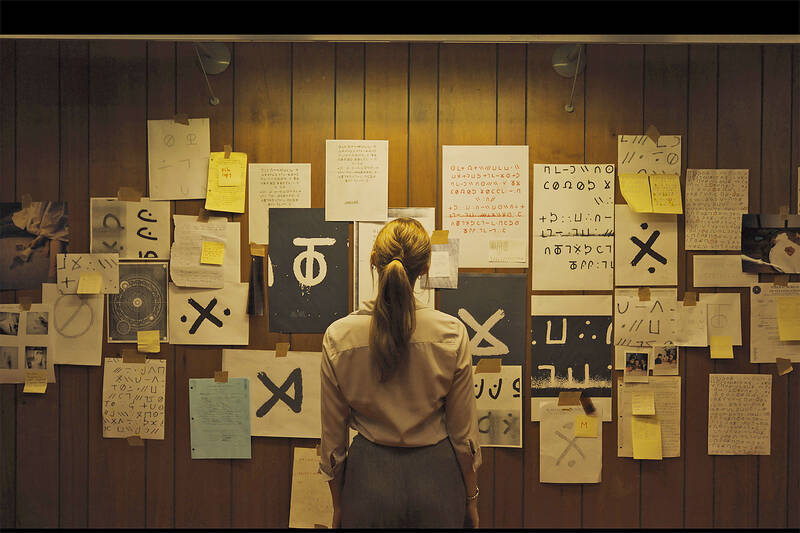Her FBI colleagues describe Agent Lee Harker (Maika Monroe) as “highly intuitive.” And if the term sounds like federal agency code for something ominous and slightly sinister, that’s because it is. Harker might lack social graces (she’d sooner lurk alone in her coffin-like, wood-lined cabin than engage in small talk), but she has uncanny instincts when reading a crime scene.
Or she does for some of the time, at least — it’s a gift that is selective and intermittent. But as jovial, gregarious Agent Carter (Blair Underwood) observes: “Half-psychic is better than not psychic at all.”
Carter is clearly the glass-half-full type, particularly if the glass is half full of whiskey. He has recruited Harker to work on a confounding cold case, hoping that her abilities may help to get the investigation moving again. What he couldn’t have anticipated is the fact that her presence acts as a catalyst, luring out the shadowy figure known as Longlegs (a thoroughly chilling Nicolas Cage) — a grotesque, glam rock-obsessed goblin of a man who is implicated in a series of mass murders that span decades.

Photo: AP
And so the scene is set for the buzzy latest film from Osgood Perkins (Gretel & Hansel, I Am the Pretty Thing That Lives in the House), a grimly atmospheric FBI procedural with occult overtones that has been declared, in some of the more excitable corners of the Internet, as the second coming of The Silence of the Lambs.
Of course, hype is the kind of spotlight that rarely flatters its subject, and these kinds of comparisons do the film no favors at all. Longlegs is not in the same league as Jonathan Demme’s masterpiece, or for that matter Seven, another frequent comparison. Among other things, the writing — specifically a crude chunk of third-act exposition — lets it down. But still, there is plenty to admire in this oppressively brooding and superbly acted chiller. To paraphrase Carter, perhaps half-great is better than not great at all.
One of the film’s most impressive assets is Monroe, who, having starred in It Follows and Watcher, is among the few actors who can match Mia Goth in the ranks of this generation’s finest genre performers. Harker is stonily antisocial with her colleagues, a woman most at ease in the murky reaches of her own mind. But she’s a gifted agent, blessed with the kind of unwavering focus that results from being far more at ease unpicking the ritualistic details of a serial killer’s modus operandi than you are going for drinks with your workmates.

Photo: AP
When Carter forces her to socialize, hauling Harker away from the blood-red carpet on which she has spread the clues of the case and into a bar, she sits rigidly upright, hands clasped, clearly itching to get away from the boozy good times and back to work. Her focus pays off; with a little help from a friend, she cracks the killer’s coded messages and identifies a pattern to the deaths, mapping them on to an inverted triangle, a symbol with occult significance.
And this is one of the film’s other key strengths. Perkins clearly has an eye for a striking image. At first, we are struck by a recurring motif of obsessive symmetry within each shot, and an aspect ratio that switches between the tight little box reminiscent of home movie footage for a 70s flashback to a full rictus grin of a widescreen frame for the main story, set in the 90s.
But once Harker has identified the satanic emblem, the screen is full of angles and triangles (created by shooting into the corners of rooms or foregrounding the zigzag of a staircase). Some of these shapes point upwards; more often they are inverted, perhaps subliminally signposting “the man downstairs,” as Longlegs coyly refers to the devil. Even the film’s structure takes a three-sided form, with the story neatly divided into three chapters. There’s an unexpected elegance to this window into unimaginable evil.

Photo: AP
The framing is slyly effective when it comes to introducing Longlegs himself. We first see him from a child’s perspective, his eyes concealed as we focus on his mouth and the ghastly voice that comes out of it. Moist and querulous, it’s the kind of voice that sounds overloaded with spittle and joyful malice. With his powdery complexion and flapping hands, Cage has never been more chilling.
But this ultimately ties into one of the niggling issues with Longlegs. Having created a potentially iconic horror villain, the picture attempts to broaden the peril to encompass secondary malevolent characters. But since there is nothing else in the movie remotely as terrifying as Cage singing Happy Birthday and cackling like a maniac while wearing a rubbery facial prosthesis, its bloody final act seems oddly anticlimactic.

The Democratic Progressive Party (DPP), Chinese Nationalist Party (KMT), and the country’s other political groups dare not offend religious groups, says Chen Lih-ming (陳立民), founder of the Taiwan Anti-Religion Alliance (台灣反宗教者聯盟). “It’s the same in other democracies, of course, but because political struggles in Taiwan are extraordinarily fierce, you’ll see candidates visiting several temples each day ahead of elections. That adds impetus to religion here,” says the retired college lecturer. In Japan’s most recent election, the Liberal Democratic Party lost many votes because of its ties to the Unification Church (“the Moonies”). Chen contrasts the progress made by anti-religion movements in

Taiwan doesn’t have a lot of railways, but its network has plenty of history. The government-owned entity that last year became the Taiwan Railway Corp (TRC) has been operating trains since 1891. During the 1895-1945 period of Japanese rule, the colonial government made huge investments in rail infrastructure. The northern port city of Keelung was connected to Kaohsiung in the south. New lines appeared in Pingtung, Yilan and the Hualien-Taitung region. Railway enthusiasts exploring Taiwan will find plenty to amuse themselves. Taipei will soon gain its second rail-themed museum. Elsewhere there’s a number of endearing branch lines and rolling-stock collections, some

Last week the State Department made several small changes to its Web information on Taiwan. First, it removed a statement saying that the US “does not support Taiwan independence.” The current statement now reads: “We oppose any unilateral changes to the status quo from either side. We expect cross-strait differences to be resolved by peaceful means, free from coercion, in a manner acceptable to the people on both sides of the Strait.” In 2022 the administration of Joe Biden also removed that verbiage, but after a month of pressure from the People’s Republic of China (PRC), reinstated it. The American

Chinese Nationalist Party (KMT) legislative caucus convener Fu Kun-chi (傅?萁) and some in the deep blue camp seem determined to ensure many of the recall campaigns against their lawmakers succeed. Widely known as the “King of Hualien,” Fu also appears to have become the king of the KMT. In theory, Legislative Speaker Han Kuo-yu (韓國瑜) outranks him, but Han is supposed to be even-handed in negotiations between party caucuses — the Democratic Progressive Party (DPP) says he is not — and Fu has been outright ignoring Han. Party Chairman Eric Chu (朱立倫) isn’t taking the lead on anything while Fu